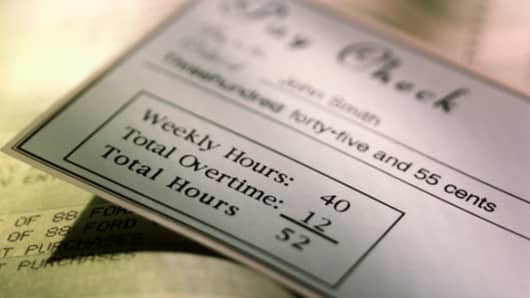Volatile financial markets, a struggling global economy and political uncertaintytoday often make it difficult for investorsto focus on saving and investing for tomorrow or, never mind, decades down the road.
While studies increasingly show investors in their 20s, 30s, 40s and 50s focused on saving for retirement, many of them aren't saving enough and aren't even sure how much to save. (More: How much are you saving?)
In fact, a new survey from T. Rowe Price finds more than two-thirds of workers between ages 21 to 50 who have a 401(k) plan are contributing less than 10 percent of their salaries to the plan and 29 percent of workers aren't even sure how much they are contributing.
That's likely because people are uncertain about how much they should be saving.
Whether you're 35 or 55, one of the most frequently asked questions when it comes to saving for retirement is how much money will I need?
What is the magic number?
Rather than suggest a hypothetical sum of money, many financial experts advise figuring out your number, based on a multiple of your current salary. It could be eight times or more than 12 times your salary, depending on whom you ask.
Fidelity Investments — the nation's largest provider of 401(k) plans — advises making sure you've saved at least eight times your final salary in order for you to retire by your 67th birthday. Fidelity assumes you'll earn a 5.5 percent annual return on the investments in your retirement portfolio. (Read More: Why your 401(k) may need advice.)
The 401(k) service provider Financial Engines points out that the more money you make, the more you'll likely spend, so 12 times your salary may indeed be the magic number for more affluent workers. (Read More: Spendthrifts and nest eggs don't mix.)
Focusing on milestones along the way, rather than simply on the final mark, may be an easier way to think about building your retirement savings. (Read more: Ways to catch up on savings.)
The key is to start early.
"Saving early in one's adulthood increases the compounding of earnings over a decade-long period," said Christine Fahlund, a certified financial planner with T. Rowe Price. "That can significantly improve the chances that younger investors will be prepared for retirement. Trying to make up later for lost savings time can be very difficult, at best." (Read More: Are men better savers?)
T. Rowe Price suggests workers should have the amount of their current salary saved by the time they're 30 in order to work their way up to having 12.5 times their salary in retirement savings by age 65.
If that's too high for you to contemplate now, Fidelity's age/savings benchmarks below may seem more attainable.
- 35 — one times your salary
- 45 — three times your salary
- 55 — five times your salary
That puts you well on your way to have eight times your salary saved by the time you're 67.
Fidelity's benchmarks are based on a hypothetical worker saving in a 401(k) or another workplace retirement plan, beginning at age 25, working and saving continuously until 67, and living until 92. The end goal would include savings in all qualified retirement accounts, including 401(k)s and IRAs, as well as other outside savings. (Read More: Juggling 401(k)s.)
So this leaves out a swath of workers who don't contribute to a 401(k) or have access to one.
Self-employed business ownersmay also have a tough time making these marks, said certified financial planner Tim Maurer, co-author of "The Ultimate Financial Plan." They "often tend (wisely) to concentrate their wealth, especially in the early phases of their business, in their business, not in their 401(k)."
"But in general, the additional guidance Fidelity has introduced here will benefit many by creating more reachable and manageable interim goals," Maurer added. "I love that!"
There may be some disagreement in calculating a magic number, but the goal of setting these benchmarks is clear. Financial services firmswant to motivate you to save.
Certainly it's good business for them to be able to invest more of your money, but it's even better for you to have saved enough so that you don't outlive your money.
— Sharon Epperson


